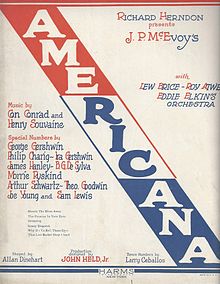| Americana | |
|---|---|
 Sheet Music Cover Sheet Music Cover | |
| Music | Con Conrad and Henry Souvaine |
| Lyrics | J. P. McEvoy |
| Book | J. P. McEvoy |
Americana is a musical revue in two parts, with book and lyrics by J. P. McEvoy, and music by Con Conrad with additional numbers by George Gershwin, Ira Gershwin, Philip Charig, James Hanley, B. G. DeSylva, Morrie Ryskind, Arthur Schwartz, Theo Goodwin, Joe Young, and Sam Lewis. The show was presented by Richard Herndon at the Belmont Theatre (121 W. 48th Street, New York, NY), and, after many postponements, opened July 26, 1926. The show was staged by Allan Dinehart with dance numbers by Larry Ceballos. The production was designed by John Held, Jr. It ran for 224 performances, closing in February 1927. The cast headlined Lew Brice, Roy Atwell, Betty Compton, Charles Butterworth and the Eddie Elkins Orchestra. The New York Times review called it a "witty, ingenious and sophisticated evening of fun-making, it made up in its abundant humor for more than it lacked in some other departments." The other departments referred to were lack of chorus girls and opulent settings.
The revue was revived on October 30, 1928, at Lew Fields’ Mansfield Theatre for 12 performances, closing November 3, 1928. It had music by Roger Wolfe Kahn and lyrics by J. P. McEvoy and Irving Caesar. The cast included Frances Gershwin, the younger sister of George and Ira Gershwin. The New York Times review called it "a reasonably bright and generally entertaining revue . . ."
After trying out in Philadelphia, the show was revived once again on October 5, 1932, at the Shubert Theatre running for 77 performances until December 1932. It was produced by Lee Shubert and had music by Jay Gorney, Harold Arlen, Herman Hupfeld, and Richard Myers, with lyrics by E. Y. Harburg and sketches by J. P. McEvoy. It was directed by Harold Johnsrud with scenic design by Albert R. Johnson. The cast included Don Barclay, George Givot, the Doris Humphrey Dance Group, Lloyd Nolan, and the Charles Weidman Dancers. It contained the famous song, “Brother, Can You Spare a Dime?”, which a New York Times review called "the first song of the year that can be sung" and remarked "Mr. Gorney has expressed the spirit of these times with more heart-breaking anguish than any of the prose bards of the day." The show was also favorably reviewed for its dance numbers.
Songs
|
First Production
|
Third Production
|

References
- Mantle, Burns, ed. (1927). The Best Plays of 1926-27. Dodd, Mead & Co. p. 363. OCLC 1028725751.
- ^ "Americana BROADWAY ORIGINAL 1926". Playbill. Archived from the original on 7 May 2022. Retrieved 27 September 2022.
- "AMERICANA APPEALS AS REVUE OF IDEAS; Its Art and Humor Outweigh Its Lack of Chorus Girls and Opulent Settings. GOOD TUNES AND SKETCHES Roy Atwell, Lew Brice, Charles Butterworth and Harriett Burke Excel in Their Roles". The New York Times. July 27, 1926. pp. Sports Amusements 15. Archived from the original on 27 September 2022.
- Mantle, Burns, ed. (1929). The Best Plays of 1928–29. Dodd, Mead & Co. p. 406. OCLC 1028724152.
- "Americana BROADWAY REVIVAL 1928". Playbill. Archived from the original on 27 September 2022.
- "'AMERICANA' REVIEWS REVUES AMUSINGLY; McEvoy Pot-Pourri Tuneful and Up-to-Date, With Music by Roger Wolfe Kahn". The New York Times. 31 October 1928. pp. Sports Amusements 28. Archived from the original on 27 September 2022.
- Mantle, Burns, ed. (1933). The Best Plays of 1932-33. Dodd, Mead & Co. p. 395-396. OCLC 1028722283.
- ^ "Americana BROADWAY REVIVAL 1932". Playbill. Archived from the original on 27 September 2022.
- Atkinson, Brooks (6 October 1932). "THE PLAY; Design and Dance in an "American Revue" That Repre- sents Modern Taste in Artistry". The New York Times. pp. Sports Amusements 19. Archived from the original on 27 September 2022.
- Martin, John (16 October 1932). "THE DANCE: A NEW FIELD IN THE THEATRE; Revue Numbers of the Early Season Make A Wide Appeal -- Notes and Comment". The New York Times. p. Section X p 11. Archived from the original on 27 September 2022.